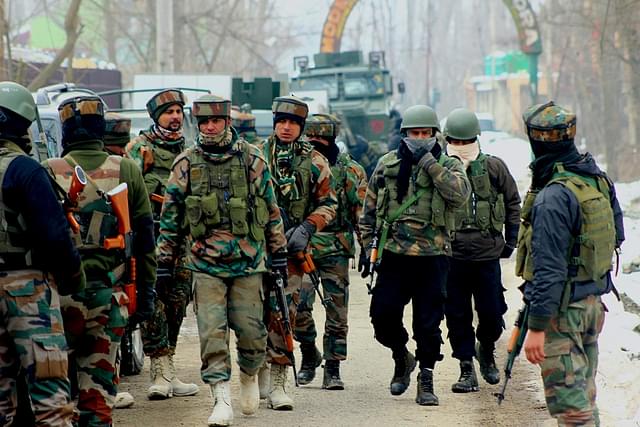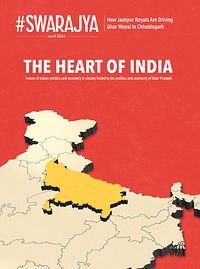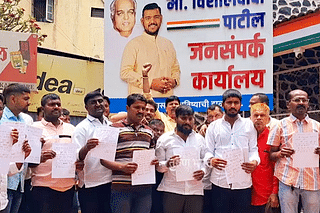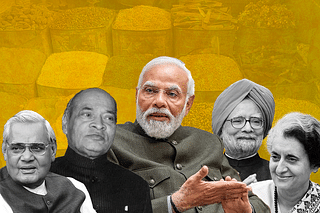Defence
Explained: Op Sarvashakti — Army's New Anti-Terror Operation To Flush Out Terrorists From Rajouri-Poonch Region
Ujjwal Shrotryia
Jan 16, 2024, 01:05 PM | Updated Jan 17, 2024, 01:02 PM IST
Save & read from anywhere!
Bookmark stories for easy access on any device or the Swarajya app.

Indian Army is launching a large scale counter-terror operation — Operation Sarvashakti — in the Poonch-Rajouri region to flush out terrorists that have been hiding and spreading reign of terror in the forested region.
The operation will be conducted by the Srinagar-headquartered 15 Corps and Nagrota-based 16 Corps of the Indian Army, on either sides of the Pir Panjal mountain range.
It will be conducted using inputs from intelligence agencies and with support from Central Reserve Police Force and Special Operations Group of Jammu and Kashmir Police.
Additional troops from reserve formations have been moved to the area to support the operation.
This follows recent incidents of ambushes and targeted killings of army convoys and soldiers by terrorists in the hilly-forested region of Poonch-Rajouri, which have resulted in the deaths of close to 30 army soldiers in the last two years, including 19 in just the past eight months.
The unusually high casualties in this region have raised alarm bells in the military and political leadership. According to army officers, multiple groups of five to six armed terrorists from Pakistani-based groups, such as Lashkar-e-Taiba and Jaish-e-Mohammed, are operating in the forests.
The thickly-forested mountains of Poonch and Rajouri, rising up to 7,000 feet, provide ideal conditions for guerilla-style operations. The spurs of these mountains originate from the Pakistani side of the Line of Control, making infiltration with Pakistani Army support easier.
After infiltrating, the terrorists, using various routes through nullahs (small streams), sometimes only have to travel 15 kilometres to reach their hideouts in the mountains.
These thickly forested areas, some so dense that sunlight rarely penetrates, provide perfect cover, allowing terrorists to evade aerial surveillance and ground patrols by the armed forces. Once entrenched, they can observe and track army movements, launching ambushes before melting back into the vast forests, often staying one step ahead of search parties.
However, no matter the suitability of the terrain for guerilla-style operations, the fact that these terrorists have operated in the region for so long without being caught is a cause for concern and suggests local support in an otherwise peaceful region.
This also indicates a possible erosion of the steadfast support historically shown by the Gujjar-Bakarwal nomadic tribes of Poonch-Rajouri for the Indian constitution.
The sharp reaction of the Indian government following the alleged killings of three civilians in army custody after the latest ambush in Dera ki Gali, which killed five army soldiers in the Surankote forest, is an attempt to address this waning support among the Gujjar-Bakarwal tribes.
The operation is reportedly modelled after Operation Sarp Vinash, conducted in 2003-04 in the same region, which involved large-scale intelligence-based sweeps and ambushes, resulting in the elimination of 65 terrorists and four soldiers, restoring peace until 2021.
During Operation Sarp Vinash, large-scale intelligence-based sweeps and ambushes were mounted by the army in the low-lying areas and mountain lairs of terrorists in the Surankote region. Multiple ambushes were conducted on the retreating terrorists, flushing them out of the area.
What set Sarp Vinash apart was the extensive preparation preceding the operation, including intensive intelligence-based operations conducted with support from the local Gujjar-Bakarwal tribes.
Save & read from anywhere!
Bookmark stories for easy access on any device or the Swarajya app.
Editorial Associate at Swarajya. Writes on Indian Military and Defence.
Introducing ElectionsHQ + 50 Ground Reports Project
The 2024 elections might seem easy to guess, but there are some important questions that shouldn't be missed.
Do freebies still sway voters? Do people prioritise infrastructure when voting? How will Punjab vote?
The answers to these questions provide great insights into where we, as a country, are headed in the years to come.
Swarajya is starting a project with an aim to do 50 solid ground stories and a smart commentary service on WhatsApp, a one-of-a-kind. We'd love your support during this election season.
Click below to contribute.





